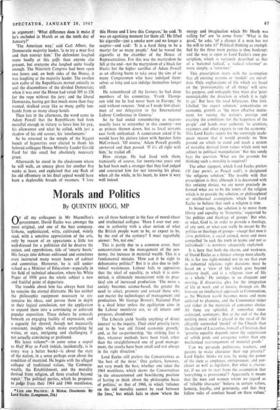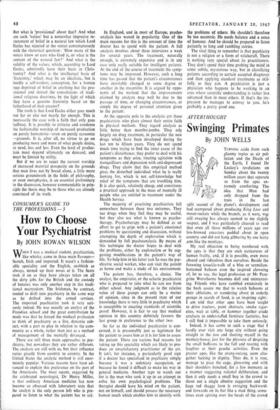Morals and Politics
By QUINTIN HOGG, MP
The trouble about him has always been that he remains the eternal dilettante. He has neithef the philosophic equipment necessary to sys- tematise his ideas, and pursue them in depth to their logical conclusion, nor the application to expand them into a convincing or coherent popular exposition. These defects he conceals beneath an engaging facility of expression, and a capacity for shrewd, though not necessarily consistent, insights which make everything he writes, or says, intriguing and challenging if not actually convincing or profound.
His latest volume—in some sense a sequel to Half Way to Faith (which, incidentally, is in every way a better book)—is about the state of the nation, in a sense perhaps even about the condition of mankind. He begins with the alleged collapse of traditional values, 'the Common- wealth, the Establishment, and the morality derived from religion, all three cracked beyond repair.' The political parties, which he proposes to judge from their 1964 and 1966 manifestos, *LIFE Joro Pourics: A MORAL DIAGNOSIS. By Lord Eccles. (Longman*, 21s.) are all three bankrupt in the face of moral chaos and intellectual collapse. 'Have I ever met any- one in authority with a clear notion of what the British people want to be, or expect to be, by the end of the century? I. must regretfully answer: No, not one.'
This is partly due to a common error, their concentration on the management of the eco- nomy, the increase in material wealth. This is a fundamental mistake. 'How can it be right to dehumanise politics?' But it is also due to indi- vidual weaknesses. Labour fails to appreciate that the ideal of equality, to which it is com- mitted, is ultimately inconsistent with its prac- tical aim of increased production. 'The more a society becomes science-based, the greater the need to select, promote and reward those who cap master the technologies of management and production. Mr George Brown's National Plan is a dead letter unless the egalitarian aims in the Labour manifesto are, to all intents and purposes, abandoned.'
The Liberals yield 'hardly anything of direct interest' to the inquiry. Their chief priority turns out to be 'our old friend economic growth,' and, as for co-partnership, 'the striking fact is that, whatever methods have been tried, other than the straightforward one of good manage- ment, the results have been small and not always in the right direction.'
Lord Eccles still prefers the Conservatives as 'the best of the three.' One gathers, however, not very much the best, whether one takes the 1964 manifesto, which shows the Conservatives 'in the unaccustomed and bewildering position of having to think about the philosophic basis of politics,' or that of 1966, in which 'reliance on the old morality cannot be read between the lines,' but which fails to show 'where the energy and imagination which Mr Heath was calling for' are `to come from.' What is the good,' he asks, 'of a chance if a man has not the will to take it?' Political thinking as exempli- fied by the three main parties is thus bankrupt. and the way is open to Lord Eccles's own pre- scription, which is variously described as that of a 'national radical,' a 'radical reformer' or. more simply, a 'reformer.'
This prescription starts with the assumption that all existing systems or 'models' are out-of- date. Only explanations of life which arc based on the 'provisionality of all things' will serve his purpose, and unhappily they must also 'point unmistakably the direction in which it is right to go.' But here the road bifurcates. One fork, labelled 'the expert solution,' concentrates on economic growth as 'the most effective instru- ment for raising the nation's prestige and creating the conditions for the happiness of the people' and hands over authority 'to scientists, engineers and other experts to run the economy.' This Lord Eccles rejects for the seemingly inade- quate reason that it would provide no 'firm ground on which to stand and teach a system of morality derived from values which were not subject to political manipulation.' But this surely begs the question. What are the grounds for thinking such a morality is required?
The other signpost, which Lord Eccles prefers fauf parier, as Pascal said'), is designated 'the religious solution.' The trouble with that prescription is that, although it is decorated with this enticing device, we are never precisely in- formed what are to be the tenets of the religion which is to provide the solution, or philosophical or intellectual assumptions which lead Lord Eccles to believe that such a religion is true.
In broad terms, the solution is to move from liberty and equality to 'fraternity,' supported by `the politics and theology of groups.' But who, or what, God is, in order to provide a theology, of any sort, or what can really be meant by the politics or theology of groups—except that man is zoo,: politikon, a social animal, more and more compelled 'to seek the truth in teams and not as individuals'—is nowhere adequately explained.
It is here that both the charm, and weakness, of David Eccles as a thinker emerge most clearly. He is far too right-minded not to see that even in industrial relations right decisions must be based on a `view of life which goes beyond industry itself, and is a religious view of life as a whole.' He indulges in an eloquent and moving, if discursive, plea for the integration of life at work and at leisure, through art. He foresees an intellectual approach to Communism, as the Western world becomes more and more addicted to planning, and the Communist richer and richer in the materials of consumer choice. All these are splendid, if somewhat unco- ordinated, sentiments. But at the end of the day nothing more solid is placed in the stead of the allegedly outmoded 'model' of the Church than the dictum of Lactantius, himself a Christian, that `genuine equality depends upon the suppression of selfish pride and arrogance rather than any mechanical rearrangement of material goods.'
'Can we persuade politicians, teachers, and parents to make character their top priority?' Lord Eccles thinks we can, by using the power of the state as employer, entrepreneur. and pur- chaser as well as legislator. But what is charac- ter, if we are to start from the assumption that 'everything is provisional'? Apparently it means that the men and women whom we regard as of 'reliable character' believe in certain values, honesty, loyalty, and generosity, and that they follow rules of conduct based on these values.' But what is 'provisional' about that? And what are such 'values' but a somewhat imprecise re- statement of belief in a natural law which Lord Eccles has rejected at the outset contemptuously with the rhetorical question : 'How many of the voters know or care who God is, or what is the content of the natural law?' And what is the validity of the values, which, according to Lord Eccles, admittedly have their basis in Chris- tianity? And what is the intellectual basis of 'fraternity,' which may be an idealistic, but is hardly a self-evident, conception, for a human race deprived of belief in anything but the pro- visional and denied the consolations of tradi- tional religious doctrines, by the light of which they have a genuine fraternity based on the fatherhood of their creator?
The truth is that Lord Eccles either goes much too far or else not nearly far enough. This is necessarily the case with a faith that only goes halfway. It is possible to criticise and condemn the fashionable worship of increased production on purely humanistic—even on purely economic —grounds. It is, after all, no virtue to go on producing more and more of what people desire, or need, less and less. Even the level of produc- tion must depend ultimately on demand, and must be limited by utility.
But if we are to reject the current worship of increased material prosperity on the grounds that man lives not by bread alone, a little more serious groundwork in the fields of philosophy, or even metaphysics, is an essential preliminary to the discussion, however commendable in prin- ciple the thesis may be to those who are already convinced of its truth.



































 Previous page
Previous page